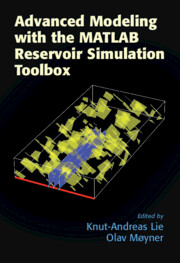Book contents
- Frontmatter
- Contents
- List of Contributors
- Preface
- Acknowledgments
- Navigating the Book and the MRST Modules
- Part I Grid Generation, Discretizations, and Solvers
- Part II Rapid Prototyping and Accelerated Computation
- Part III Modeling of New Physical Processes
- 7 Using State Functions and MRST’ls AD-OO Framework to Implement Simulators for Chemical EOR
- 8 Compositional Simulation with the AD-OO Framework
- 9 Embedded Discrete Fracture Models
- 10 Numerical Modeling of Fractured Unconventional Oil
- 11 A Unified Framework for Flow Simulation in Fractured Reservoirs
- 12 Simulation of Geothermal Systems Using MRST
- 13 A Finite-Volume-Based Module for Unsaturated Poroelasticity
8 - Compositional Simulation with the AD-OO Framework
from Part III - Modeling of New Physical Processes
Published online by Cambridge University Press: 20 November 2021
- Frontmatter
- Contents
- List of Contributors
- Preface
- Acknowledgments
- Navigating the Book and the MRST Modules
- Part I Grid Generation, Discretizations, and Solvers
- Part II Rapid Prototyping and Accelerated Computation
- Part III Modeling of New Physical Processes
- 7 Using State Functions and MRST’ls AD-OO Framework to Implement Simulators for Chemical EOR
- 8 Compositional Simulation with the AD-OO Framework
- 9 Embedded Discrete Fracture Models
- 10 Numerical Modeling of Fractured Unconventional Oil
- 11 A Unified Framework for Flow Simulation in Fractured Reservoirs
- 12 Simulation of Geothermal Systems Using MRST
- 13 A Finite-Volume-Based Module for Unsaturated Poroelasticity
Summary
The compositional module in the MATLAB Reservoir Simulation Toolbox (MRST) implements two different formulations of a three-phase compositional system that consists of a pair of multicomponent phases and an optional immisicible phase. In petroleum engineering, the aqueous phase is taken to be immiscible and the hydrocarbon liquid and vapor phases are governed by an equation of state (EoS). The overall composition formulation uses pressure and overall mole fractions as primary variables, whereas the natural variable formulation relies on solving for phase mole fractions and phase saturations simultaneously. Thermodynamic behavior is modeled using $K$-values or a (standard) cubic EoS. In the chapter, you will learn about the model equations, choice of primary variables, and numerical strategies for solving the thermodynamic problem, alone or coupled to the flow equations. We discuss details of the implementation, which builds upon the object-oriented, automatic differentiation (AD-OO) framework and utilizes state functions and generic model classes for increased modularity. We also present a few relatively simple simulation examples to illustrate typical behavior and teach you how to set up simulation cases yourself.
Keywords
- Type
- Chapter
- Information
- Advanced Modeling with the MATLAB Reservoir Simulation Toolbox , pp. 324 - 374Publisher: Cambridge University PressPrint publication year: 2021
- Creative Commons
- This content is Open Access and distributed under the terms of the Creative Commons Attribution licence CC-BY-NC-ND 4.0 https://creativecommons.org/cclicenses/
- 3
- Cited by



